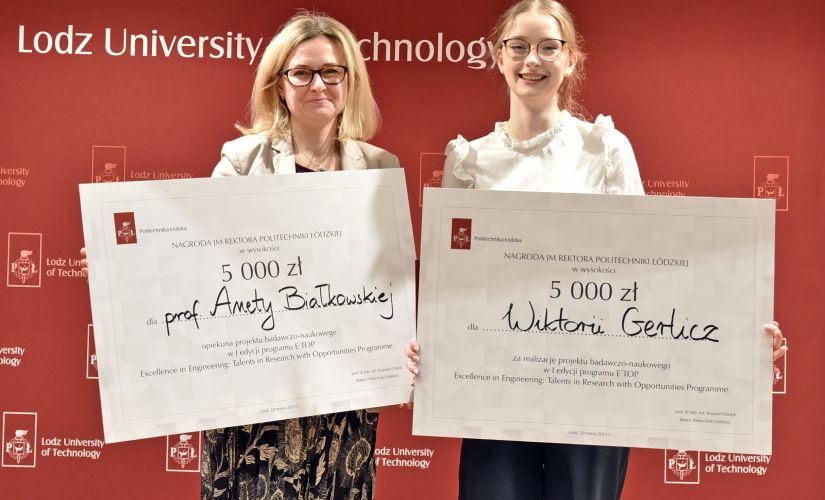Six students, all working based on the Master-Apprentice model, presented the results of their research and reflected on their collaborations. All of the presentations were excellent and demonstrated how extraordinarily talented these young people are. Also, by doing their talks they competed for the Rector's Award. And it was a competition which was not easily decided.
You can read about the students' projects in the article 'Research-based teaching'. Here is a short recap of what the projects were about: Michał Grabowski presented a 'bespoke’ knee orthosis he fabricated based on 3D printing and lightweight textile construction. Wiktor Barańczyk developed an algorithm that translates from sign language. Masza Góralczyk did a spectroscopic analysis of sulfonamides, characterized by low water solubility, in aqueous solutions. Anna Kania engineered heat-generating textile composites suitable for use in construction industry. Marta Kopytkowska designed a smart node for steel structures, inspired by bionics.
The Rector's Award went to Wictoria Gerlicz, who, in her research, sought to answer the question of what bacteria can do for the world. She isolated 109 strains that showed the potential to degrade keratin waste (animal feathers and hair). Keratin waste is a problem of considerable size. The example that Wiktoria used illustrates it best: the feathers from 12 hens, though having a mass of about a kilogram, could easily fill two extra-large bathtubs. A student of biotechnology, Wiktoria worked under the mentorship of dr hab. inż. Aneta Białkowska, TUL prof.
In an interview for Życie Uczelni Wiktoria Gerlicz said,
‘I was not expecting such a decision by the Award Panel, because I think that each of the participants did a great job in the program. That is why it feels so special for me to be distinguished amongst such talented, passionate young people. At the same time, thinking back to the first weeks of the project, I am very grateful to the people I happened to work with and without whose support I would not have got to where I am today. Doing my own research in the first year of my degree, I was basically starting at square one. I like to describe myself as a creative person, because over the last year, I found myself making almost every mistake you could possibly imagine and a few you could not. Recalling the hundreds of repeats, the hours spent at the lab, the stress, the going from tears to euphoria, I can say with a clear conscience that it was all worth it, and going even further, I would say it was the best way to combine gaining experience and studying. It feels nice to be recognized. Since the results were announced, I have received a lot of kind words that certainly encourage me to continue my work, and I grateful for them. I guess there is nothing left for me to do but go back to the lab and start gathering fresh data for the next Research Week’.
All of the students who presented the projects they had completed in the E2TOP program received diplomas and words of congratulation. Admirable were not only the results achieved by the six 20-somethings, but also the style of presentation and confidence in the subject matter discussed.
Participants of the first edition of the program also revealed the behind-the-scenes of their success. Dr Aleksandra Pawlik, who moderated the talk, reports,
'the students shared their initial concerns with the audience, emphasizing the great role of mentors in helping them overcome the difficulties and take the next steps in their research projects. They talked about the scholarship grants and the travel vouchers that allowed them to buy materials for their research or to go to a conference. They also fondly remembered their first moments at the laboratories. In just 15 minutes, the audience had a chance to see how E2TOP changed the perception of what university study means’.

